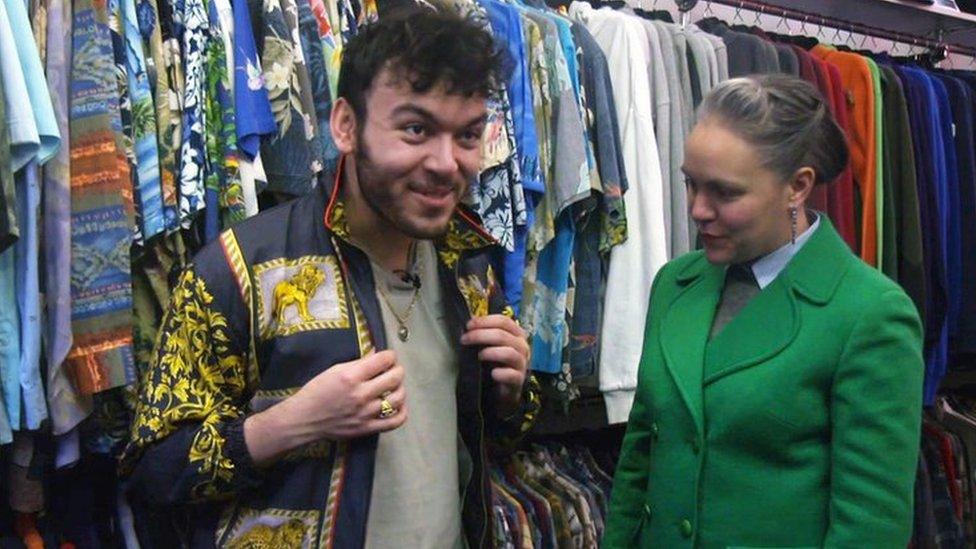Sustainable students: How easy is it to be more environmentally-friendly?
- Published
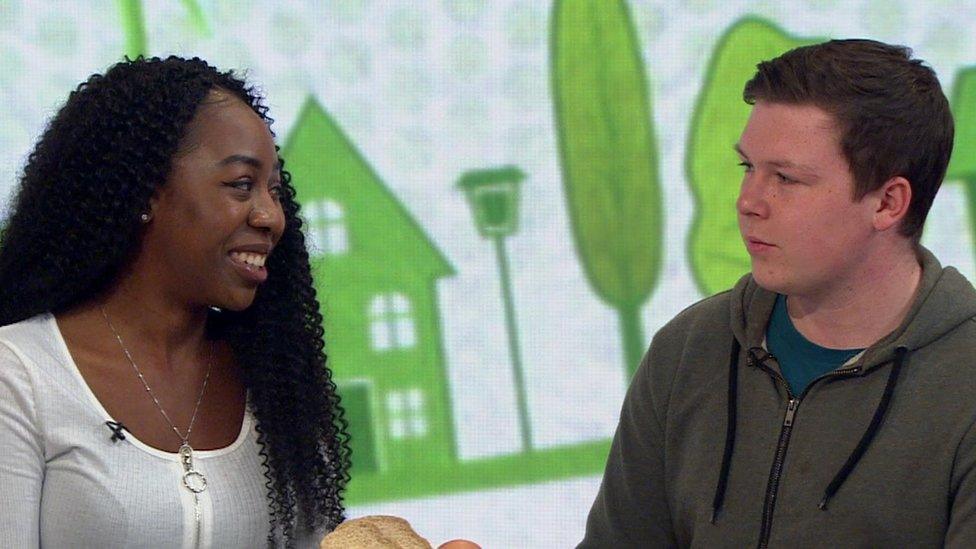
Helen, Will and their four housemates took on the challenge
Student housemates from Loughborough University have been challenged to live more sustainably, with weekly challenges set by the BBC's Victoria Derbyshire programme. How did they get on?
Plastics challenge
The students were challenged to reduce their plastic use by 75%, which they found difficult.
"It's hard when you're on a student budget, getting anything not wrapped in plastic is so much more expensive," Amy explained.
Plastics guru Lucy Siegle gave them a helping hand, swapping their countless shower bottles for sustainable versions of shampoo, toothpaste and soap bars.
She also gave them reusable items like coffee cups and cutlery and told them to change their shopping habits.
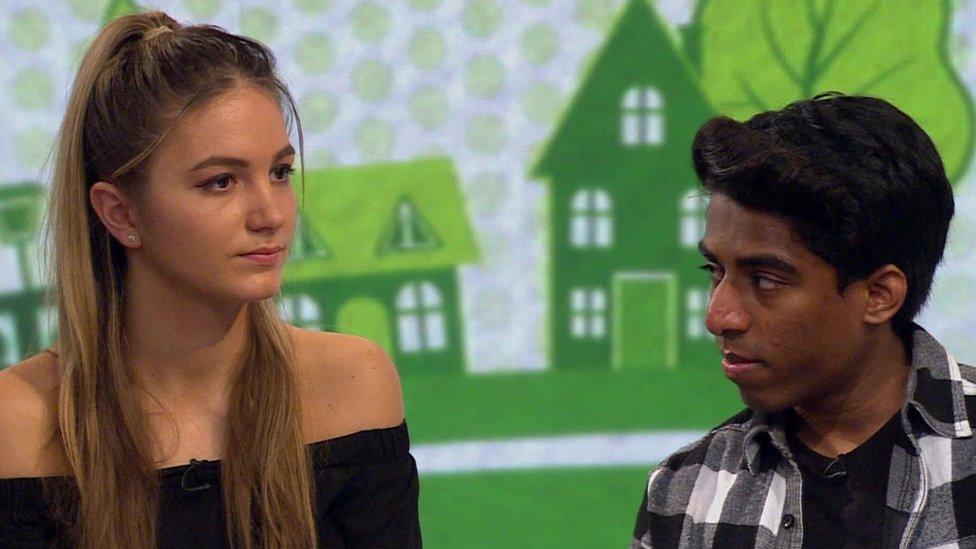
Amy Fitzgerald and Jay Maheswaran were tasked with reducing their use of plastics
But Amy said they found supermarkets a particular problem as "everything was wrapped in plastic".
"And going to the butcher's was more expensive than getting pre-packaged stuff," she added.
At the start of the week, Ms Siegle weighed the plastic in the students' home, which totalled 2.8lb (1.3kg) - a figure she described as "rather a lot".
With her advice, the students reduced it to 1.5lb.
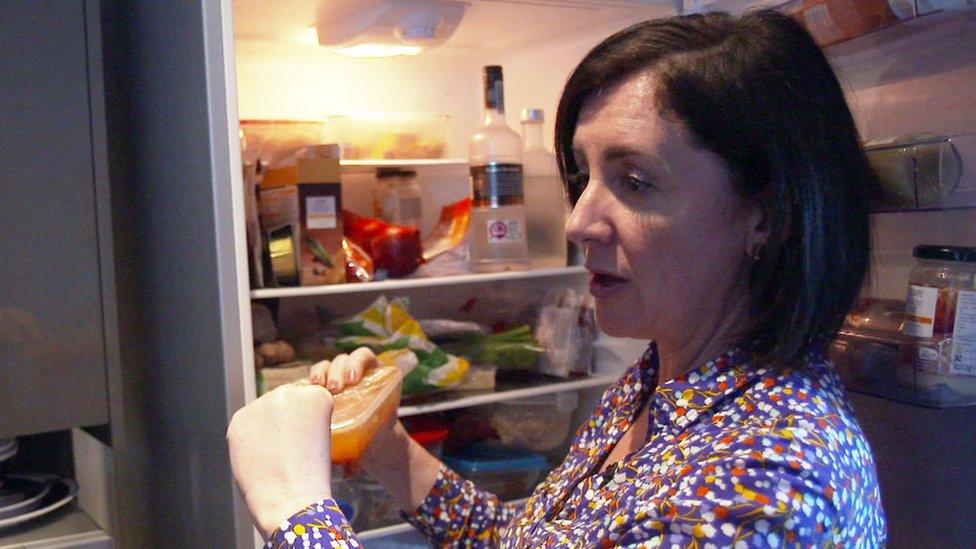
Ms Siegle was not pleased with the house's reliance on clingfilm, and confiscated their roll
"I'm still really pleased with them," she said. "Especially as when I saw all the bottles they [initially] had in their bathroom, I nearly gave up."
Ms Siegle said she thought the group had adopted the mindset shift really quickly, experiencing outrage over everything being plastic.
She urged them to be more militant by unwrapping products at the supermarket checkout and leaving the plastic behind to make the point.
"We need to take a stand," she said.
Fashion challenge
Marcus Rudd, one of the housemates, had hoped that his shopping habits - buying 10 to 15 T-shirts a year, combined with some designer pieces - were environmentally friendly.
Then he learned that it took 3,000 litres of water on average to make only one T-shirt.
The fashion industry - which makes 100 billion garments each year - is a major contributor to greenhouse gases, water pollution, air pollution and the overuse of water.

Marcus was won over by charity and vintage shops, picking out this striking jacket
It is exacerbated, MPs say, by so-called "fast fashion" - inexpensive clothing produced rapidly by mass-market retailers.
Sustainable stylist Alice Wilby taught the students to reuse, repair and recycle, encouraging them to swap fast fashion for second-hand.
She challenged Marcus and his housemate Goby Chan, who regularly buys clothes she does not wear, to make a new outfit from old clothes to model at London Fashion Week.
"We buy so much stuff and half of it sits unworn in the back of the wardrobe," Ms Wilby said.
"Before we buy anything else it's great to see what you've already got, and fall back in love with your things."
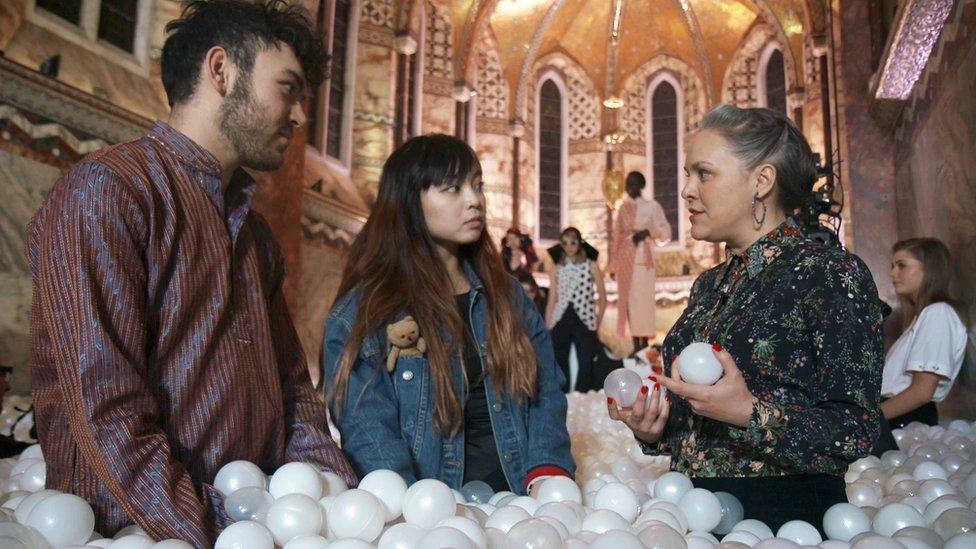
Marcus and Goby modelled recycled clothes for a Mother of Pearl show at London Fashion Week
Goby enjoyed the challenge. "I was shocked by what you can do by reusing a garment and making it into something new which is actually really fashionable. I actually love it."
And Ms Wilby said they did well.
"Considering Marcus had never set foot in a second-hand shop before - and thought they were smelly places with clothes you would never want to buy - by the end of the week he was finding pieces he really loved. That was a really great victory.
"These two shop a lot, and over the past month [since the challenge] he has only bought one item."
Energy challenge
The students took dramatic action to reduce their energy usage - and it worked.
They used much less heating - switching it off at night; wearing jumpers, coats and blankets; and generally keeping the house a little bit cooler.
It made a huge difference to their gas usage - cutting it by a whopping 48%.
They also lowered their electricity usage by 15%. This added up to a 44% carbon saving - around a tonne of carbon in all.
"It was a massive effort - it was freezing in our house," said Marcus Golby.
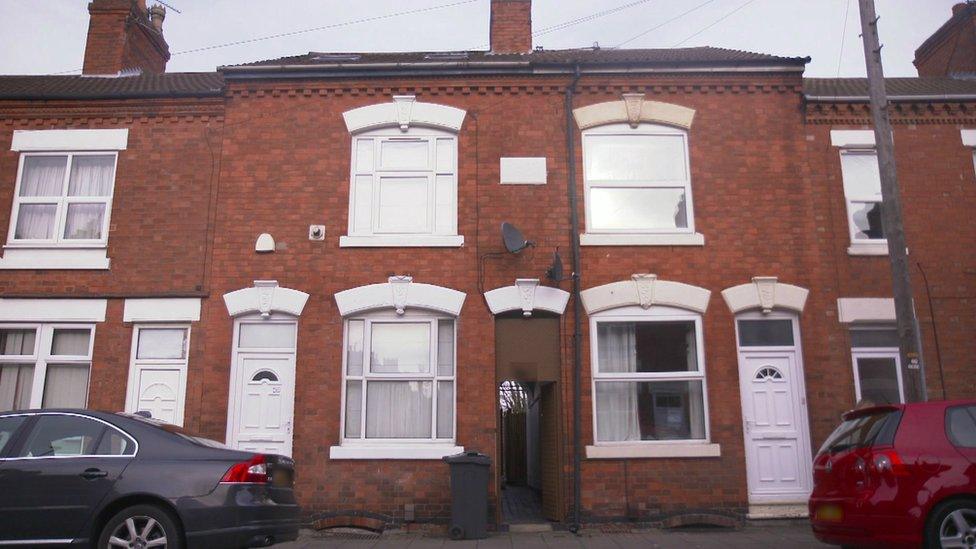
The students were able to drastically cut their home's energy bills
"[Before] we weren't communicating when things were going on and going off, so you ended up with the heating on the majority of the time," explained Amy.
"This month we're having more of a balance of keeping warm and keeping the heating off when we're out."
Dr Rosie Robison, an energy expert from Anglia Ruskin University, said it raised wider questions on whether the focus should be on individuals using less energy or the "wider responsibilities for landlords or homeowners, housebuilders and government for thinking about how our homes can require less fossil fuel in the first place".
Food challenge
A third of all food made for human consumption is wasted every year - costing the average UK family £700 each year, estimates suggest.
The students were challenged to cut their food waste by 50% and move to the planetary health diet - a plant-based diet with small amounts of meat and fish.
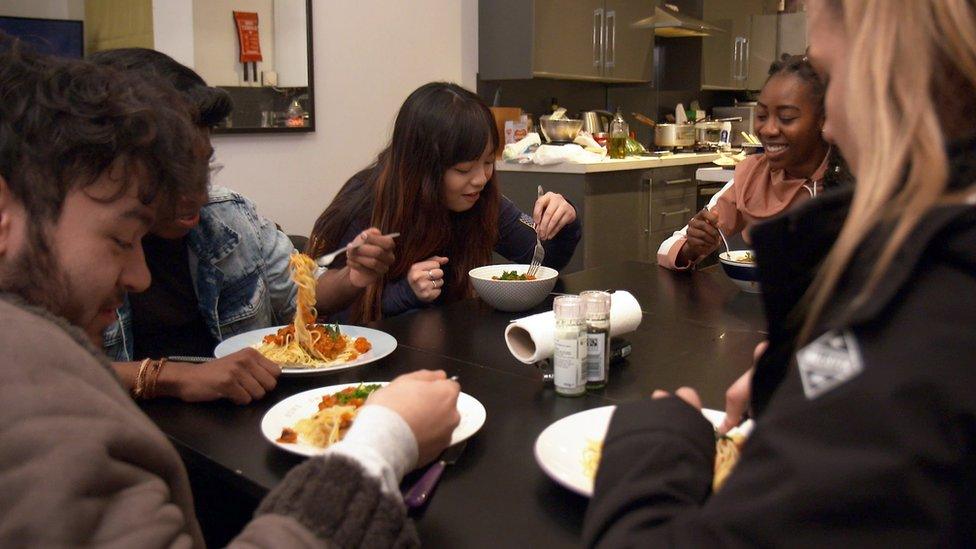
Helen and Will cooked vegetable bolognese for the house, as part of adopting the planetary health diet for a week
Dr Elliot Woolley, a senior lecturer in sustainable manufacturing at Loughborough University, encouraged them to store their food more carefully to stop it becoming spoiled, plan their meals and prepare the right amount of food for the people eating.
He said that they found the challenge hard, but had reduced their food waste from 8.1lb to 6.8lb, which he described as "a fairly small reduction".
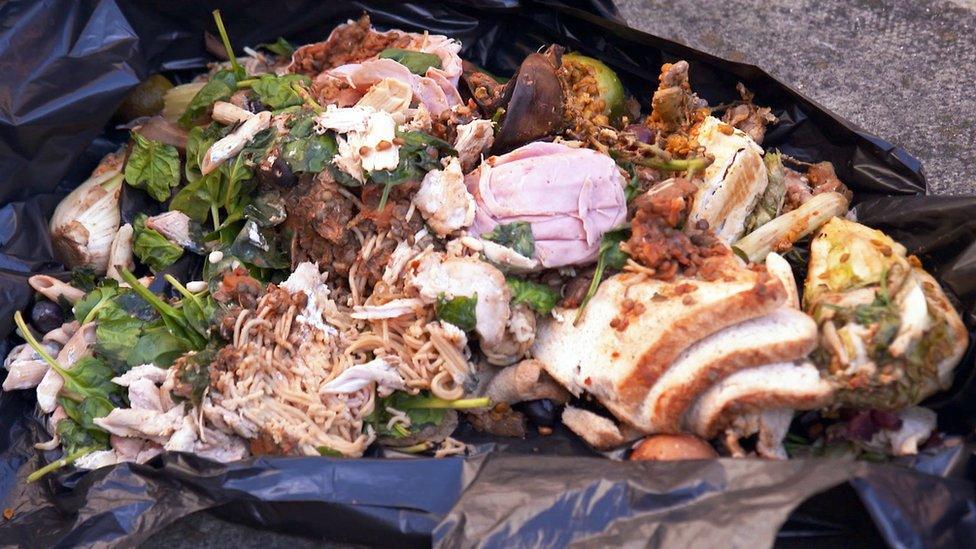
The contents of the students' food waste bin, before the challenge
Dr Woolley added: "One of the things it shows is even when you're aware of the problem and you're trying to reduce waste, it's so ingrained into how we waste and use food that actually we continue with these large amounts."
Housemate Will Smith said their waste totals were boosted by food bought before the challenge which had started to go off, but admitted: "I don't think we did too well."
But he said it had changed his mindset and he would continue trying not to waste food in future.
The Sustainable Students series was produced and directed by Owen Kean and Tom Yeates, with research by Curtis Gallant and Simon O'Leary.

Follow the BBC's Victoria Derbyshire programme on Facebook, external and Twitter, external - and see more of our stories here.
- Published8 March 2019
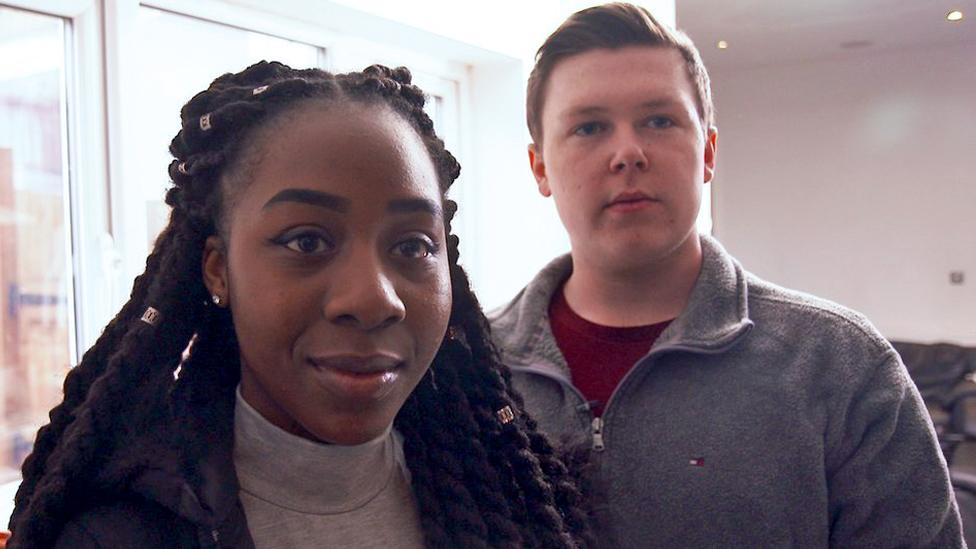
- Published22 February 2019
